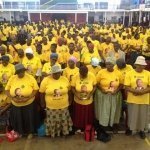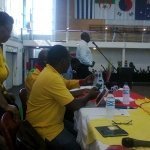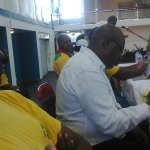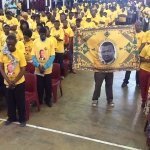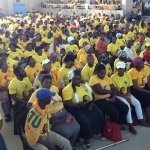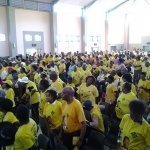• Leaders of the UDM in the Western Cape
• UDM Public representatives
• My fellow South Africans
WELCOME
Welcome to this rally of the United Democratic Movement (UDM).
Thank you for spending your time with us; thank you for coming to listen to what the UDM believes is needed so that we can transform South Africa into a Winning Nation.
We hope that you leave this rally, equipped with the necessary knowledge to make an informed decision when you cast your vote on 7 May 2014.
You are today part of an historic event. This meeting is a demonstration that it is possible for us to take charge of our country’s future, because we have the guts to take responsibility as stakeholders and investors in our country’s future.
It is therefore my honour, on this day, to share this platform with a friend and comrade, Mr Mbhazima Shilowa.
Welcome to the club Sam! Thank you for aligning yourself, and your followers, with the dreams and ideals of the UDM i.e. achieve an equitable society and a healthy democracy in South Africa.
STATE THE NATION
Every five years, South Africans meet at the voting station to choose the political party, which they think, will best govern their province and this country.
The voters will reflect on the progress made over the last five years, however, corruption sticks out like a sore thumb. Corruption is one of the main reasons why South Africa is downgraded in the international ratings and this negatively impacts on direct foreign investment
In the end the voters of this country must decide whether they want another five years of looting and abuse of state resources and the celebration of corruption.
The most recent example of this corruption is that government spent millions-and-millions of rands to build a lodge and a “fire pool” for the president at Nkandla.
What nauseates many South Africans even further is the flagrant arrogance of the president and his party. They show nothing but disdain – and did not even blink an eye when they launched the unwarranted attack on the Public Protector.
President Zuma, is a deployee of the African National Congress (ANC), the people did not elect him to power. The ANC should have summarily dealt with him, as it did when it unceremoniously got rid of President Mbeki, albeit for different reasons.
Right now there is much noise in support of the idea that parliament must attend to this fiasco, but – with due respect – parliament has failed to deal with corruption and this includes Nkandla. We know very well what the ANC’s stance is on the matter. Why then should we waste our time; the next Parliament must be given a fresh mandate by the people.
Come 7 May, voters must decide whether they want to put their eggs in the ANC’s basket. They must decide whether they want to suffer another five years of looting of state resources.
LEVELS OF GOVERNMENT: WHO IS RESPONSIBLE FOR WHAT?
There are definite signs that the deal that was struck in 1994, to create a quasi-federal system (i.e. a central government, distinct from the individual governments of the provinces), has enforced racism and tribalism.
You are likely to agree with the UDM that the various provinces are not treated the same. If you doubt this, just take a look at the skewed budget allocations and distribution of resources from one province to the next.
That said, the Western Cape has a problem that sets it apart from the other eight provinces. More often than not, the provincial and national governments are at loggerheads and they each refuse to employ reason and logic.
This practice of grudge politics is counterproductive.
Whilst they merrily attack each other, the people wallow in the malaise of poverty, underdevelopment, whilst service delivery is at an all-time low.
The Democratic Alliance (DA) and the ANC spend more time slinging mud at each other, instead of focussing on finding solutions, which will have a positive impact on the lives of the Western Cape’s citizens.
A side-effect, of this political grandstanding, is that the aforementioned parties are – either wilfully or unwittingly – polarising the people in this province. It is an inescapable reality that this fans the flame of tension between different communities in this province.
Amidst the debris of these battles, the people of the Cape Flats still remain forgotten and live in the very same shacks they lived in since the early 80’s. Not the ANC or the DA can claim that they have made a tangible changes to the lives of these people. The only worth that is associated with the poor is that they serve as mere voting cattle.
Another reality that seems to escape the powers that be, is that Premier Helen Zille and her government, are not a law unto themselves. Like any other premier, she is accountable to central government – whether she likes it or not.
The UDM takes a dim view of both the central (ANC) and the provincial (DA) governments’ inability to swallow their pride, to set their difference aside, to serve the people of this province.
SOCIO-ECONOMIC PROBLEMS IN THE PROVINCE
One of the socio-economic problems in this province (which of course is not unique) is service delivery protests. It is clear that the provincial administrations of the ANC and the DA turned a blind eye to the poor for decades.
The people are so frustrated and angry that the only way in which they can elicit a reaction from government is by burning tires on the streets, blocking highways and tossing stones at innocent road users.
The UDM has a strong stance against civil disobedience, but we have some understanding of the plight of these disenfranchised communities.
The domino effect then sets in – service delivery protests leads to the perception that Cape Town is an unsafe travel destination. This in turn impacts negatively on much needed income that is generated through tourism.
In the meantime our young people are lured into crime, drugs and the gangsterism, because of underdevelopment and lack of education in disadvantaged communities – especially in rural areas and in the townships.
Yes, we agree, the South African Police Service should pull up their socks, but the sad reality is that active policing only addresses only the symptoms and not the underlying problem.
The DA can hold as many marches as it likes and hand over memorandums to the police, but that solves nothing. The root cause of the problems should be addressed.
A UDM government will “go back to basics” i.e. the implementation of the original agenda, which is to ensure a better life for all South Africans. In this regard, our manifesto and policies describe what the UDM will do should it be given an opportunity to govern.
ENTREPRENEURSHIP AND WEALTH CREATION
The Western Cape is not endowed with mineral riches, but it makes up for that in terms of income generated through tourism, the winemaking industry and other agricultural activities.
The problem is that the income generated from the aforementioned sectors very rarely reaches the desperately poor. The gap between the rich and the poor is ever widening in this province.
In addition, Cape Town used to be dotted with factories where clothing, shoes and other such products were produced. These factories generated many jobs because they are labour intensive. Where did all these companies disappear to… and why?
.
The UDM believes that enterprising South Africans should be funded through sectoral banks. In this regard we are particularly reminded of small fishery concerns and aquaculture.
CULTURAL HISTORY OF THE PROVINCE
No matter from which perspective you look at the Western Cape’s history, the fact remains that this province is endowed with a very rich cultural history.
However the indigenous communities have voiced concerns that they are disenfranchised. A UDM delegation recently visited the Khoisan King. The King and his headmen conveyed their feelings that government, on national and provincial levels, have ignored them to a great extent and have undermined the role that traditional leaders play in the Western Cape.
CONCLUSION
The UDM members and supporters must hit the ground running. Go out there, speak to the people and spread the gospel of the UDM.
We cannot afford to sit with our arms folded whilst the majority of our people live in abject poverty, for future generations will judge us harshly, because we let bad things happen on our watch.
Time is running out, 7 May is around the corner! Good luck in your campaigning.
I thank you




